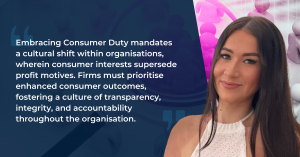Cultural Transformation
Embracing Consumer Duty mandates a cultural shift within organisations, wherein consumer interests supersede profit motives. Firms must prioritise enhanced consumer outcomes, fostering a culture of transparency, integrity, and accountability throughout the organisation. Embedding this new mindset throughout the organisation is key to fully investing in the needs of consumers and aligning with the Duty.



















